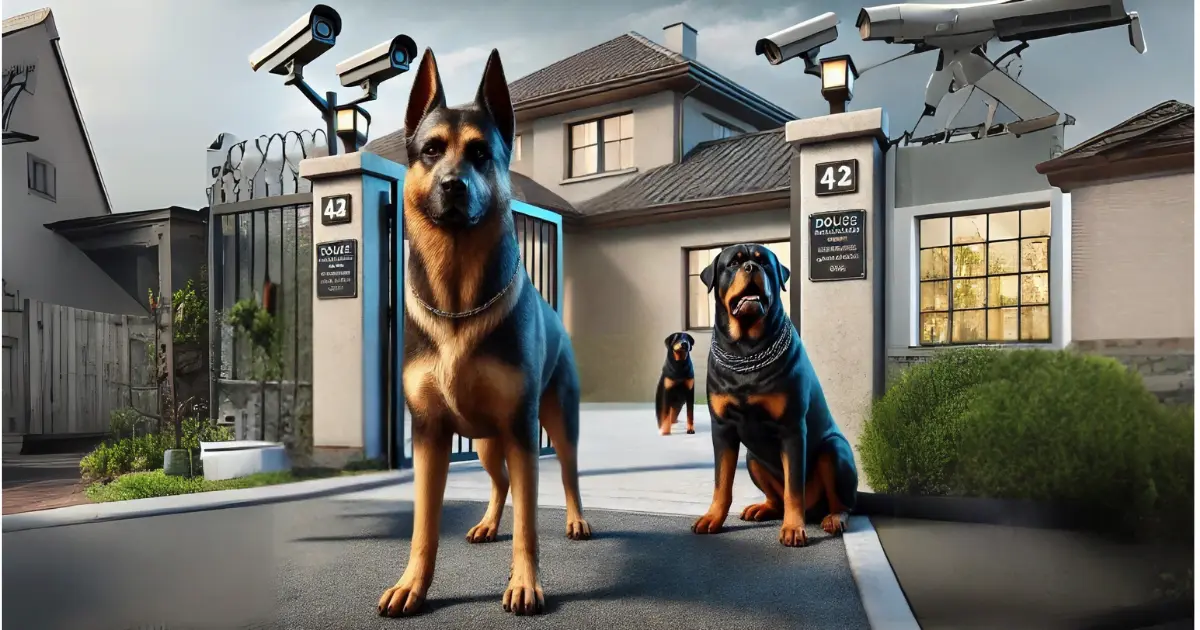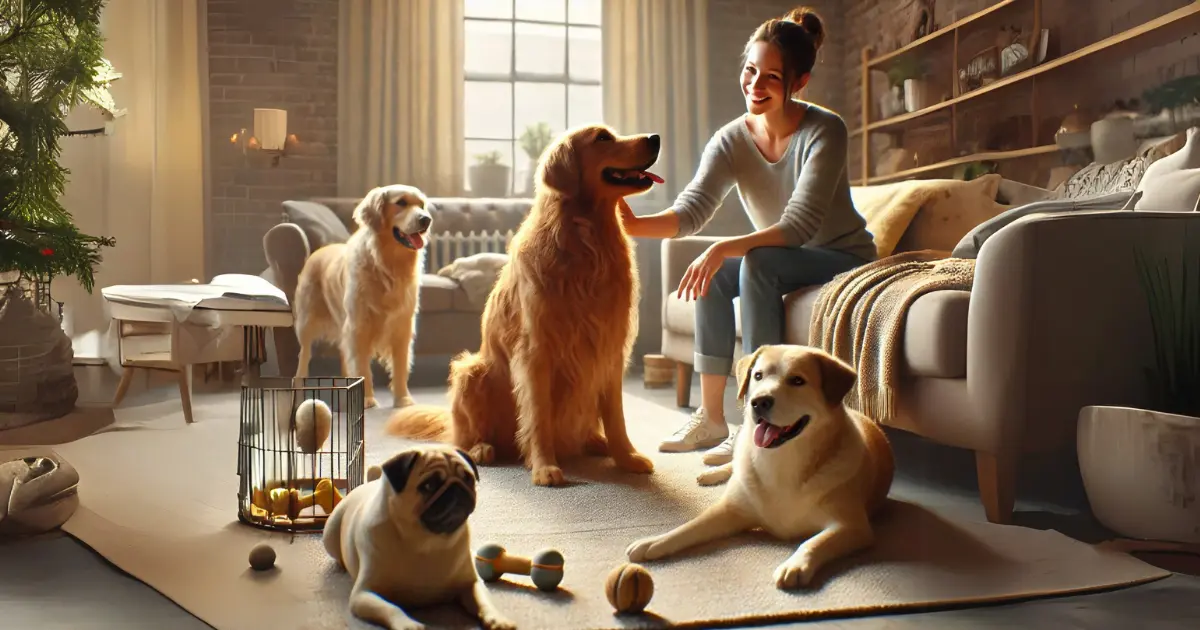Guard Dogs vs Companion Dogs: Which One’s Right for You?
Published: 20 Jan 2025
Choosing a dog is a big decision. Some dogs are born protectors, ready to guard your home and family. Others are loving companions who make your life brighter with cuddles and wagging tails. But how do you decide between guard dogs vs companion dogs? Once you’ve decided on the perfect dog, picking one of these unique dog names with meaning can make them even more special. Let’s dive into what makes them different and help you figure out which one suits your life best.

Table of Contents
What Are Guard Dogs Like?
Guard dogs are your protectors. They don’t just watch over your home—they’re loyal, brave, and always alert. Breeders design these dogs to act quickly when they detect danger, whether it’s an intruder or something unusual nearby.
Traits of Guard Dogs
- Always on duty: These dogs are naturally watchful.
- Fearless defenders: They won’t hesitate to stand up to a threat.
- Loyal to the core: Guard dogs form deep bonds with their families.
- Sharp and bright: They learn commands and tasks quickly.
Examples of Guard Dog Breeds
- German Shepherds: The ultimate protector, often seen working with police or military.
- Doberman Pinschers: Sleek, fast, and always ready to guard.
- Rottweilers: Calm but mighty, perfect for protecting homes.
- Akitas: Independent, confident, and intensely loyal.
When Would You Want a Guard Dog?
Picture this: You live in a quiet neighbourhood, and safety is a concern. A Doberman could give you peace of mind by keeping a close watch on your property. Guard dogs thrive when they have a purpose.

What About Companion Dogs?
If you’re looking for a dog who makes you smile every day, a companion dog might be the way to go. These dogs are affectionate, friendly, and all about being part of your life. They don’t focus on protecting you—they want to love you.
Companion dogs are naturally calm and relaxed, often spending long hours resting. Learn more about why dogs need so much sleep to ensure they’re healthy and happy.”
Traits of Companion Dogs
- Full of affection: They’ll snuggle with you on the couch without hesitation.
- Friendly with everyone: They love meeting new people and making friends.
- Calm and easygoing: Perfect for relaxed lifestyles or families with kids.
- Less intense: They don’t have the high energy or guarding instincts of protectors.
Examples of Companion Dog Breeds
- Golden Retrievers: Playful, loving, and great with kids.
- Cavalier King Charles Spaniels: Sweet lap dogs who adore attention.
- French Bulldogs: Small, charming, and ideal for apartment living.
- Pugs: Quirky little dogs with prominent personalities.
When Would You Want a Companion Dog?
Imagine this: You’re a family with young kids, and you want a dog who can join in playtime and then nap on the couch. A Golden Retriever would be a perfect fit—fun, gentle, and always eager to please.

Guard Dogs vs. Companion Dogs: What’s the Big Difference?
Here’s a simple breakdown to help you see how they compare:
| Trait | Guard Dogs | Companion Dogs |
|---|---|---|
| Main Focus | Protection and security | Emotional bonding and friendship |
| Temperament | Alert, bold, and independent | Calm, gentle, and sociable |
| Training Needs | Advanced and consistent | Basic obedience is enough |
| Energy Levels | High; needs regular activity | Moderate; enjoys downtime too |
| Social Nature | Reserved with strangers | Open and welcoming |
How to Decide Between the Two
Still not sure? Here are some questions to guide you:
- Do you need extra security? If safety is a top concern, go for a guard dog.
- How much time do you have for training? Guard dogs need more attention when it comes to learning and discipline.
- What’s your energy level? Active individuals may enjoy the demands of a guard dog, while companion dogs are better for relaxed routines.
- Who’s in your household? Companion dogs are great with kids and seniors, while guard dogs are better suited for adults or experienced owners.
Blurring the Lines: Can Dogs Be Both?
Here’s the fun part—some dogs can balance both roles! Breeds like Labrador Retrievers or Boxers can be playful and loving but also serve as excellent watchdogs. It’s like having the best of both worlds!
Real-Life Tips for Choosing Your Dog
- Know your lifestyle: If you’re home often and enjoy downtime, a companion dog is perfect. If you’re outdoorsy or need protection, consider a guard dog.
- Think about space: Big, active breeds need room to move. Smaller companion dogs can thrive in apartments.
- Meet the dog first: Spend time with the breed or individual dog to ensure their personality matches your needs.
- Get expert advice: A vet, trainer, or shelter worker can help you decide which type of dog fits your family.
“For a detailed guide on different dog breeds, including their traits and history, visit the American Kennel Club (AKC).
Final Thoughts
Guard dogs and companion dogs each have their way of making life better. Guard dogs stand by your side with unwavering loyalty, always ready to protect you, while companion dogs fill your days with love, laughter, and plenty of cuddles. The choice depends on what you need and the kind of connection you want with your furry friend.”Regardless of whether you choose a guard dog or a companion dog, following essential dog care tips can help them thrive.”
Which one feels like the perfect match for you? Whether it’s a brave protector or a lovable cuddle buddy, one thing’s certain—life is so much better with a dog by your side. 🐾
FAQ
1. Can a guard dog also be a good companion?
Yes, some breeds, like German Shepherds and Boxers, can be both protective and loving. Proper training helps balance their guarding instincts with a friendly temperament.
2. Do companion dogs bark as much as guard dogs?
Companion dogs generally bark less than guard dogs, as they lack the same protective instincts. However, barking can depend on the breed and individual temperament.
3. Are guard dogs harder to train than companion dogs?
Guard dogs often require more structured training to manage their protective instincts. Companion dogs are typically easier to train as they focus on bonding and basic commands.
4. Can small dogs be guard dogs?
Yes, small breeds like Dachshunds and Chihuahuas can act as watchdogs by alerting you to unusual activity. However, they lack the physical strength to deter intruders.
5. Do guard dogs and companion dogs have different exercise needs?
Guard dogs often need more intense physical and mental exercise to stay healthy. Companion dogs are usually content with moderate activity like daily walks and playtime.
6. What’s the cost difference between a guard dog and a companion dog?
Guard dogs often cost more due to their specialized training and maintenance needs. Companion dogs are generally less expensive but can still vary by breed.
7. Do guard dogs need socialization?
Yes, socializing guard dogs is crucial to prevent over-aggression or fearfulness. Early exposure to different people and environments helps them become well-balanced.
8. Are companion dogs better for first-time owners?
Yes, companion dogs are usually a better choice for first-time owners as they are easier to handle and require less intense training. Breeds like Golden Retrievers or Pugs are great starters.
9. Do guard dogs live as long as companion dogs?
Guard dogs, especially large breeds, often have shorter lifespans compared to smaller companion dogs. However, proper care and regular vet checkups can help extend their lives.

- Be Respectful
- Stay Relevant
- Stay Positive
- True Feedback
- Encourage Discussion
- Avoid Spamming
- No Fake News
- Don't Copy-Paste
- No Personal Attacks



- Be Respectful
- Stay Relevant
- Stay Positive
- True Feedback
- Encourage Discussion
- Avoid Spamming
- No Fake News
- Don't Copy-Paste
- No Personal Attacks





